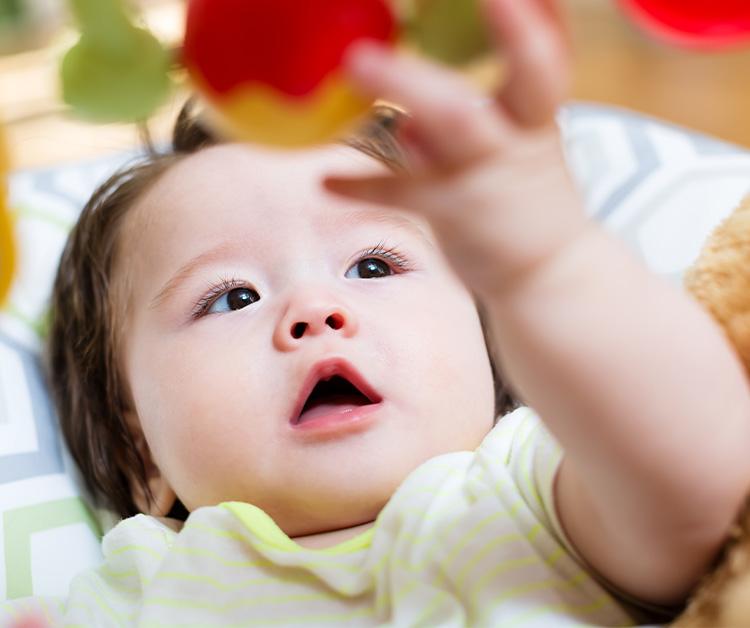Due to maintenance, rewards points for receipt uploads will be delayed. Thank you for your patience!

Let's take a journey through your baby's growth and development milestones, from those first adorable coos to their confident first steps.
As your baby’s brain develops, they become more and more capable of communicating, moving, and revealing more of their personality! Growth and brain development is not a race; it’s a journey. We encourage everyone to support your children with as much nutrition, education, and love as you can to support them in that journey, and celebrate the following milestone moments when you reach them.
As your baby grows, they reach significant milestones that mark their progress in various areas of development. Here's a glimpse at the key milestones to anticipate:
In those early days, your baby's brain is like a little sponge, soaking up everything around them! Every sound, touch, and cuddle is shaping their brain. It's incredible how much growth happens in such a short time.
| Age Range | Developmental Milestones |
|---|---|
| 0-3 months | Rapid formation of neural connections; basic reflexes like sucking and grasping. |
| 3-6 months | Increased social awareness; smiles and responds to familiar faces; begins to babble. |
| 6-9 months | Improved motor skills; reaches for objects; explores surroundings with curiosity. |
| 9-12 months | Enhanced understanding of simple words and gestures; may take first steps; increased cognitive development. |
Ever wondered why your baby stares at your face with those big, curious eyes? Well, their vision is still developing! At first, they see the world in fuzzy shapes and high contrast colors. As they grow, so does their sight!
| Age Range | Developmental Milestones |
|---|---|
| 0-3 months | Limited vision, focusing on objections 8-12 inches away; begins to track moving objects with eyes. |
| 3-6 months | Ability to distinguish colors, especially high contrast ones; improved depth perception. |
| 6-9 months | Can see across the room; exploring objects with hands and eyes. |
| 9-12 months | Continuing to refine visual skills; beginning to recognize familiar objects and faces from a distance. |
Babble, coo, gurgle - it's all music to your ears! Your baby's speech journey starts with those adorable sounds they make. They're learning to control their mouth and tongue to mimic the sounds they hear around them. So, talk to them, read to them, and respond to their babbling. It's not just adorable; it's building the foundation for their future language skills!
| Age Range | Developmental Milestones |
|---|---|
| 0-3 months | Communicates through cries, coos, and gurgles; begins to imitate some sounds. |
| 3-6 months | Starts babbling repetitive sounds like "ba-ba" or "ma-ma"; experiments with vocal cords. |
| 6-9 months | Understands simple words and gestures; may respond to their name. |
| 9-12 months | Begins to say first words, though they may not be perfectly clear; continues to expand vocabulary and language skills. |
Editor’s note: The following are for illustrative purposes and not meant to forecast exact timelines. Each every baby’s monthly development may vary, and many of these milestones may happen several months earlier or later than indicated. Please consult your pediatrician for more specific guidelines that pertain to your baby.
For a detailed look at 1-month old milestones, explore our comprehensive guide.
To learn more about your baby's development, review our 2 month milestones guide.
Discover more 5-month old milestones in our full article.
Learn what else your baby may be doing at this stage in our 7-month milestone article.
For more insight into 8 month old milestones, explore our detailed guide.
Your child's brain is still growing at a furious pace in the toddler years. As they move through different stages of brain development, you can expect great strides in developing cognitive, motor, social and communication skills.
While every child develops at their own pace, there may be indicators of developmental difficulties such as…
If you have concerns for any reason, don’t hesitate to reach out to your pediatrician for guidance and support.
Your parenting journey will be full of milestone moments, and we want to be there for you every step of the way. Join Enfamil Family Beginnings® for more guidance on your baby’s development, plus access to our 24/7 ask-a-nurse feature, and countless ways to earn points towards rewards and prizes exclusively for our members! There’s no cost to become or remain a member–only benefits that we sincerely hope you take advantage of and find useful. We can’t wait to welcome you to the Enfamil family!
Join nowAll information on Enfamil, including but not limited to information about health, medical conditions, and nutrition, is intended for your general knowledge and is not a substitute for a healthcare professional's medical identification, advice, or management for specific medical conditions. You should seek medical care and consult your doctor or pediatrician for any specific health or nutrition issues. Never disregard professional medical advice or delay seeking medical treatment, care, or help because of information you have read on Enfamil.